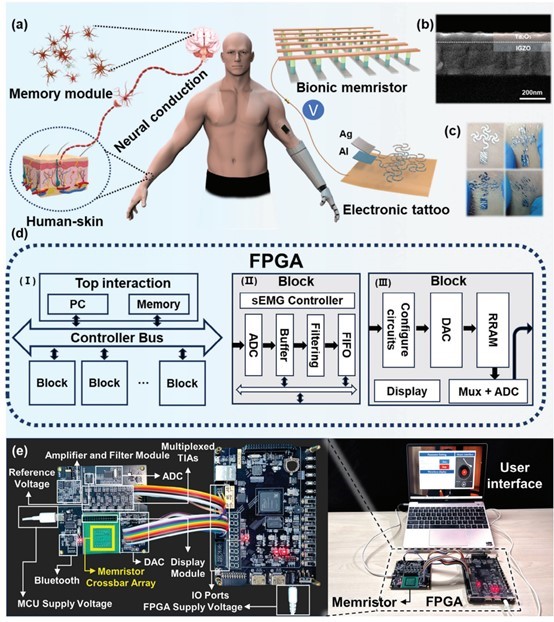Prof. Nam-young Kim’s Research Team Successfully Develops 'Integrated Perception-Memory System
- admin
- 2024-09-13
- 1300
· Professor Nam-young Kim’s Research Team (Department of Electronic Engineering)
Successfully Develops 'Integrated Perception-Memory
System Using Electronic Tattoos and Memristors’
- Published in the scientific
journal Advanced Science (JCR 3.8% Q1, IF: 15.17) -
- Successful development of 'Integrated Perception-Memory System Using Electronic Tattoos and Memristors’ -
The research team led by Professor Nam-young Kim from the Department of Electronic Engineering, in collaboration with Professor Li Yang, has successfully developed an 'Integrated Perception-Memory System Using Electronic Tattoos and Memristors.'
The integrated 'perception-memory' system is gaining increasing attention due to its important applications in simulating the human retina and brain, as well as in humanoid robots. Here, a platform-boost system based on an FPGA (Field Programmable Gate Array) enabling sensing, recognition, and memory for human-computer interaction is reported, using a combination of ultra-thin Ag/Al/Paster-based electronic tattoos (AAP) and Tantalum Oxide/Indium Gallium Zinc Oxide (Ta2O5/IGZO)-based memristors.
Notably, AAP demonstrates an excellent ability to accommodate deformations caused by skin movement, thanks to its unique structural design, which ensures a safe and comfortable fit on the skin and enables long-term monitoring of physiological signals. By giving the memristor a high switching ratio and building an integrated system with AAP to detect, distinguish, store, and control the physiological signals of multiple individuals' hand movements, the proposed system implemented control of a music interface using facial electromyography signals and logical entailment.
Professor Nam-young Kim said, "The newly developed 'perception-memory' integrated system not only enhances human-computer interaction by providing services to people with disabilities but also improves their quality of life and autonomy. This innovative technology is expected to be utilized in various fields in the future.“

[Integrated
Perception-Memory System Using Electronic Tattoos and Memristors]
Meanwhile, this research was supported by the National Research Foundation of Korea (NRF) under a research program funded by the Ministry of Education (RS-2023-00302751). The research results were published in the internationally renowned journal Advanced Science (IF=15.17), published by Wiley, under the title ‘A Human-Computer Interaction Strategy for an FPGA Platform Boosted Integrated “Perception-Memory” System Based on Electronic Tattoos and Memristors.’ (https://doi.org/10.1002/advs.202402582)